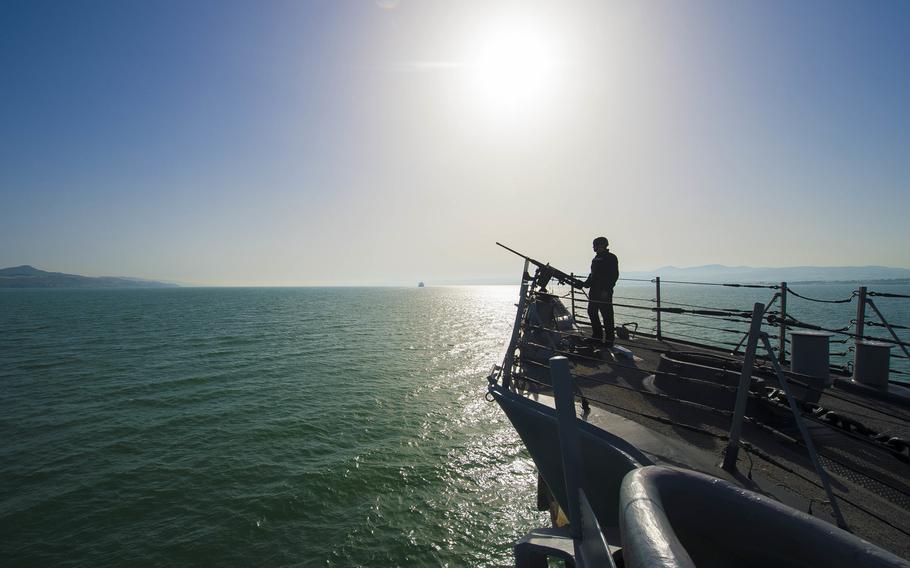
Fire Controlman 3rd Class Ryan Cushing from Englewood, Fla., mans a .50-caliber machine gun aboard the USS Ross as the ship transits the Dardanelles Strait May 23, 2015. An Arleigh Burke-class guided-missile destroyer forward-deployed to Rota, Spain, is conducting naval operations in the U.S. 6th Fleet area of operations. The U.S. Navy on Sunday, May 31, 2015, denied reports that Russian fighter jets forced the Ross from its course in the Black Sea. (Robert S. Price/U.S. Navy)
NAPLES, Italy — The U.S. Navy on Sunday denied reports that Russian attack aircraft forced an American warship from its course in the Black Sea.
Russia’s state-run media agency RIA Novosti reported Saturday that the country’s navy scrambled Su-24 fighter jets when the American guided-missile destroyer USS Ross allegedly approached Russian territorial waters after departing port in Romania. It quoted an unnamed source as saying the ship’s crew was acting “provocatively and aggressively.” According to the report, the ship changed course after detecting the aircraft.
U.S. Naval Forces Europe-Africa denied that account in its statement, saying the ship was operating in international waters and never altered operations. The release said the ship observed the Su-24 aircraft in routine operations but did not interact with them and that ship crewmembers acted professionally.
“Ross continued on her mission after observing the aircraft return to base,” the statement read. “At no time did Ross act aggressively nor did she deviate from her planned operations.”
The dueling narratives are the latest to arise out of U.S. or NATO operations in European airspace and bodies of water where Russia is present. The Russian military has kept close tabs on allied deployments and exercises on the Continent since tensions flared over Moscow’s annexation of Crimea in March last year, with Russian media often describing allied operations as offensive in nature.
American and European officials say Russian forces have frequently ignored the territorial boundaries of its neighbors, forcing them to scramble aircraft in response.
They say Russian pilots have flown without transponders and in some cases maneuvered dangerously around other military aircraft and ships. The USS Donald Cook was buzzed by Su-24 attack jets during a visit to the Black Sea in April 2014, according to the Navy.
Russia is especially sensitive about deployments to the Black Sea, a traditional seat of the country’s naval power. Its Black Sea Fleet is located in Sevastopol on the Crimean Peninsula.
The U.S. has been making regular visits to the Black Sea since Russia’s intervention in Crimea, sending a destroyer, cruiser or frigate into the region on an almost monthly basis, often performing low-level exercises with Black Sea allies, such as Romania and Bulgaria.
The Navy says its ships remain in international waters, unless scheduled for a port call, and follow rules set out by the Montreux Convention, an international agreement that governs foreign warship visits in the Black Sea.
The Ross entered the Black Sea on May 23 and conducted exercises with the Romanian navy before Saturday.